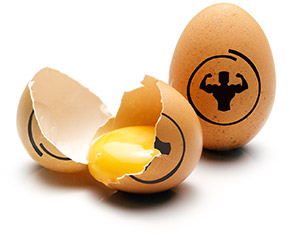Protein yields approximately 4 calories per gram, which is the same energy concentration as carbohydrate. The recommended level of protein intake for the general population is 12 to 15% of total daily calories. Therefore, someone consuming 2,000 calories per day has an energy equivalent of 240 to 300 calories (60 to 75 grams) of protein per day. Most non-athletes do well with 0.8 grams of protein per kg of body weight. Using this guideline, a 75kg non-athlete has a protein requirement of 60g per day. On a per kilogram basis, athletes have a higher protein requirement because of a greater lean muscle mass, a greater need for tissue repair, and because a small amount of protein is burned during physical activity. This increases the protein requirement for athletes to approximately double that of non-athletes (1.2 to 1.7 grams per kilogram). Therefore, a 75kg athlete has a protein requirement of 120 grams per day (480 calories). Although 120 grams of daily protein may seem high, it represents a relatively small proportion of total daily calories.
Athletes Need More
Athletes require a higher protein intake than non-athletes for a number of reasons:
- Amino acids from protein contribute 5 to 15% of the fuel burned during exercise. The amount of protein used for energy rises as muscle glycogen decreases. It is generally thought that endurance exercise is more glycogen depleting than power exercise, so endurance activities are likely to cause a higher proportionate usage of protein
- Exercise may cause muscle damage, which increases protein requirement to repair tissue
- Endurance exercise may cause a small amount of protein to be lost in the urine (where there is typically none or very little without exercise).
 Although most athletes have no difficulty consuming sufficient protein, the following athletes should monitor protein intake because it may be difficult for them to get enough:
Although most athletes have no difficulty consuming sufficient protein, the following athletes should monitor protein intake because it may be difficult for them to get enough:
- Young athletes who have the combined demands of muscular work and growth
- Athletes who are restricting food intake to achieve a desirable weight
- Vegetarian athletes who do not eat meat, fish, eggs, or dairy products
- Athletes who restrict food intake for religious or cultural reasons.
Source: Advanced Sports Nutrition
